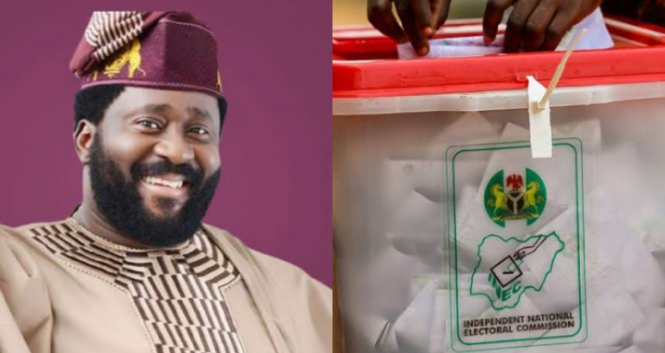
Lagos State Assembly Member Desmond Elliot from Surulere 1 asserts that holding a Permanent Voter Card (PVC) reflects civic dedication, not party allegiance.
He cast his vote Saturday at Onitolo Nursery/Primary School, Unit 009, amid local council polls across Lagos’s 20 local government areas and 37 development councils.
Elliot contends Nigerian citizens should not expect public support if they abstain from elections. “You can’t sit at home and later come to seek help from people who others sacrificed to vote into power,” he said.
He noted initial turnout as modest but predicted higher participation as voting continued into the afternoon.
He emphasized the importance of local elections, stating they directly influence daily life, with devolved revenue and powers now residing at grassroots levels. Elliot added that electing leaders who prioritize community needs in markets, inner roads, and primary healthcare remains vital .
Elliot applauded the Lagos State Independent Electoral Commission (LASIEC) for managing the polls efficiently and peaceably .
In April, Lagos lawmakers—including Elliot—pressed the Attorney‑General and Commissioner for Justice to enforce the 2015 Tenancy Law, targeting arbitrary rent hikes. Elliot flagged rent leaps of 100–200% in Surulere following infrastructure development.
He urged that residents deserve protection under the law and an overhaul of the two‑year advance policy, burdened by high agency fees .
As the Surulere 1 representative since 2015, Elliot serves his third term in the Lagos Assembly under the All Progressives Congress (APC) . A meticulous vote‑watcher and grassroots advocate, he blends political savvy with community engagement.
He stands firm that civic participation—particularly voting—remains the foundation of government accountability.
During the weekend’s local elections, citizens across Lagos faced ballots for local chairmen and councillors. Elliot urged residents to recognize that holding a PVC followed by active voting cements their entitlement to government interventions—such as infrastructure projects, health resources, and educational initiatives. Voters, he reminded, hold the power to shape who will allocate funds and development at the local level.
Development and empowerment often start with electing competent local representatives, he said. With revenue and decision-making authority returned to local councils, citizens can no longer leave communities under‑represented and later demand services they failed to elect.
Elliot’s critique struck at a broader concern: democratic apathy. Though low participation in local polls often stems from negative perceptions or fatigue, he asserted that real change begins at home. “Development begins at the grassroots level,” he said, urging Lagos residents to use their PVCs not as partisan tokens but as certificates of civic agency.
This push ties back to the Assembly’s wider legislative agenda. When lawmakers lobbied for implementation of the Tenancy Law, Elliot highlighted that local issues—such as unfair rent—mirror wider civic responsibilities. Residents need informed representation, but representatives need voters who show up.
Across the 37 development council areas, Elliot predicted rising voter momentum by midday. LASIEC’s orderly proceedings—marked by smooth accreditation, fast voting, and visible security—offered hope for strengthened democratic engagement .
Efforts to educate citizens on their rights under tenancy and electoral laws remain underway. Elliot sees these as complementary. A voter who knows their civic and housing rights forms a stronger, more empowered community.
Ahead of results, Elliot welcomed the system’s integrity and public trust. He believes Lagos residents, once activated, will hold their elected leaders accountable—a vital step toward sustainable development and responsive governance.



